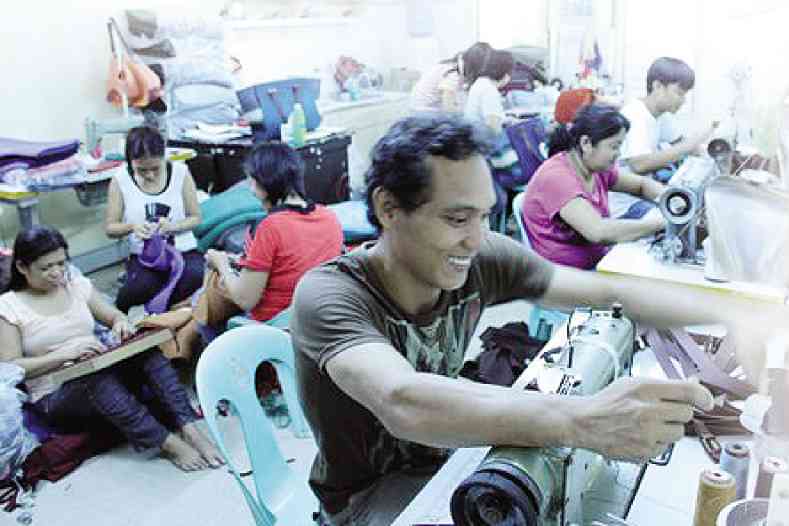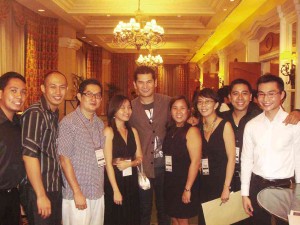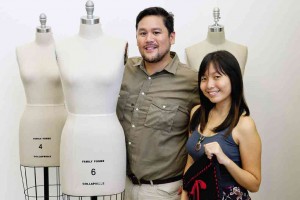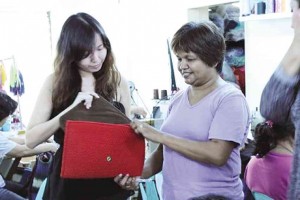Rags2Riches: A social leveler unlike any other
Amid heaping piles of refuse that reeked of squalor and lost dreams, the nine of them found each other about seven years ago.
Each of them was in Barangay Payatas in Quezon City under different circumstances. The students among them, like Reese Fernandez-Ruiz, were there for a class activity or immersion program. Father Xavier Alpasan was on a pastoral mission, while the rest—including now Senator Bam Aquino—were there for their personal advocacy.
What they saw and experienced in Payatas at that time disturbed them—extreme poverty, people scavenging for food in the trash and eating pagpag (what’s left of the food thrown in the trash), shanties devoid of basic necessities, jobless men and women, and dirty malnourished children on the streets where crime was ever present.
What also caught their attention in Payatas were the women who would toil for hours to make rugs out of scrap, selling the finished products to middlemen for a measly P12 to P16 a day.
“That amount, considering the work they were doing, was ridiculously low. It can’t feed a family nor allow anyone to dream of a brighter future,” says Reese, the youngest in the group.
Article continues after this advertisementThe nine of them decided to do something, to help some, if not all the people, fend for themselves. They knew it had to be something sustainable and more meaningful than mere dole outs and feeding programs.
Article continues after this advertisementThe group thought the rug-making skill of the women of Payatas would be a good takeoff point. So, one day in 2007, the group—Reese, Fr. Alpasa, Aquino, Ange Benavides-Bulan, Timi Gomez-Aquino, Memey Mendoza, Maan Lim, TJ Agulto and Mark Ruiz—went back to Payatas bringing with them not food nor goods but a business partnership proposition to members of the community, particularly to the women artisans in the area.
That led to the birth of Rags2Riches, now a multiawarded, for-profit social enterprise that makes a variety of eco-ethical fashion and home accessories, designed by some of the country’s best designers, for sale here and overseas.
It now has a stable of more than 900 artisans from Payatas, as well as similar communities in Tondo, Caloocan and Sucat.
The group now dreams of expanding Rags2Riches’ reach to other underprivileged areas outside Metro Manila and of finding a permanent home (it is currently renting a residential house that it converted to an office and workshop) for its eco-ethical manufacturing operations. It also has an Artisan Academy and a warehouse.
Trust issues
“Our beginning was not easy,” according to Reese, president of Rags2Riches.
Fr. Alpasa helped the group pitch its business proposal to the community. But trust issues were so strong that, of the hundreds or even thousands of artisans they talked to, only three took their chance with the group.
With a donation of P10,000, the group and the three women, who are still with Rags2Riches to this day, immediately got down to work, getting the scrap cloth themselves straight from factories and marketing whatever were made by the artisans mostly in school bazaars. The immediate goal was to take the middlemen out of the equation.
Sales at the bazaars were good.
“People bought the rugs not because it is a ‘positive story’ but because the products are functional,” Reese says.
With no middlemen cutting into the profit, the three participating artisans earned much bigger from the sales.
With the success of the venture, more people started to join.
“The three grew to 30, then 50, 100 to more than 900,” Reese recalls.
The incorporators had to infuse additional capital into the company to support the growth of the company’s operations.
Big break
The breakthrough, she says, came two months after Rags2Riches was formed, when the group met top fashion designer Rajo Laurel.
“We didn’t know anything about fashion. We just wanted to help the community. We needed someone to help us with the design so we can upgrade and add value to our products. Rajo (Laurel) was on top of our minds. We looked for him, discussed with him our business, and showed him samples of our products. He was impressed and he immediately agreed to help.”
The night after the meeting, Rajo hardly slept, spending almost the entire night conceptualizing products and designs for Rags2Riches, says Reese.
The following day, he sent Reese’s group concepts and designs of products that could be fashioned out of cloth scraps—vanity kits, wine holders, bags and other items of different configurations.
“He has an amazing sense of style, integrity and compassion for what we are doing. Of course, when Rajo says it is beautiful, people agree sometimes even without thinking about it.”
People bought the products and soon, fashion outlets started carrying Rags2Riches products.
Although Rags2Riches has its in-house designers and other consultants, Rajo remains engaged, dedicated to the cause and goals of the group, serving as company adviser for free.
Whole package
Rags2Riches is not only about producing and selling chic foot rugs, fashion and home accessories, it is more about looking after the welfare of its partner-artisans, caring for the environment and promoting the Filipino culture. It is also about partnerships and volunteerism.
Also, it is a business, not a project. All the artisans, suppliers, subcontractors and employees are ably represented in Rags2Riches’ board.
The mostly women artisans are housewives and mothers who need to take care of their homes and families. This means they have to work at home and cannot devote most of their time for work.
It would have been a logistical nightmare for Rags2Riches, considering that it had no business model to follow. Fortunately, the group was able to identify the bottlenecks early on, allowing its founders to craft a system that would let the artisans work at home without compromising the quality of the products and the company’s commitments to customers.
Under this system, the artisans are given the tools to make their assigned parts of the products, mainly wooden panels. Each artisan, however, has to commit to a specific number of hours a day for work. Most of them committed two to three hours.
Based on the number of hours committed, Rags2Riches can estimate the volume of panels they can produce a day. The panels are delivered to a center in each participating community for quality control and preparation for delivery to the workshops, where they are assembled into finished products.
“It is tricky and very behavioral, but it teaches them self-control, discipline and leadership,” Reese says.
Better life, future
For working two to three hours, each artisan gets P350 to P500 a day, which is enough to feed a family. This amount also enabled the artisans to send their children to school. With this, Reese says, many can start planning for a future.
But Rags2Riches’ role in the artisans’ lives does not end there. Its board members—the nine people who formed the company—decided they have to guide the artisans in taking care of themselves and their future.
Rags2Riches has a “quality of life program”—a savings and micro-insurance program, in partnership with the bank of CARD Inc. (the country’s leading microfinancing institution). Under the program, the artisans are taught to save for their future. Portion of their earnings goes straight to their deposit accounts in CARD Bank.
“All of them now have their own bank passbooks. For many, it was their first time to own passbooks in their names and they are very proud of it. Their passbooks are like their tickets to the future,” says Reese.
Rags2Riches tapped CaMia (Card MRI Insurance Agency), also of CARD, to provide the artisans certain safety nets. It covers housing, hospitalization and others that will not only enable them to rise above financial shocks but also do long-term planning.
Another initiative, the Artisan Academy, involves the holding of skills and quality of life workshops for the artisans. At present, the academy is manned by only two people, Reese says. But through partnerships, it is able to hold financial literacy programs (with the Bangko Sentral ng Pilipinas and Bankers Association of the Philippines), family counseling, values-formation and nutrition seminars.
“We didn’t plan all these when we were starting. These programs came about one after the other as we saw the need for them,” Reese says.
Expansion
Rags2Reaches has been expanding on all fronts—its base of artisans, markets and raw material suppliers. It is now using indigenous raw materials in its fashion and home accessories, which helps promote not only the materials but also the cultures that nurtured them.
The tinalak, a hand-woven textile made of abaca fiber, is one of those that Rags2Riches often uses in its products.
It is a tapestry produced by the T’bolis of Lake Sebu in South Cotabato. Each tinalak piece features intricate designs that represent the weavers’ dreams and memories. Unfortunately, Reese says, the younger generation seems to have lost interest in tinalak weaving. By using tinalak in its products and, in partnership with a social enterprise, Reese says Rags2Riches hopes to revive and protect this cultural heritage.
It aims to expand its reach particularly to rural artisans so they do not have to migrate. “We talk to different communities and NGOs (nongovernment organizations) and find out if we can buy their items, and if we can integrate them in our designs,” says Reese.
As Rags2Riches expands its product lines, it tapped the services of other leading Filipino designers including Amina Aranaz-Alunan, Oliver Tolentino, Olivia d’ Aboville and Kenneth Cobonpue to help in creating new product concepts.
Partnerships
“We (incorporators) are all community workers, none of us was really into business. So we took in partners and stakeholders who can provide us the business sense,” according to Reese.
Rags2Riches has expanded its markets here and abroad through partnership with several retail outlets and online stores www.ava.ph, www.zalora.ph and www.munishop.multiply.com. For the domestic market, its products are carried by House of Laurel, The Ramp, Aranaz Firma, The Give Store, Beachmums, and the gifts stores of Makati Shangri-La, Edsa Shangri-La, Shangri-La Mactan and Shangri-La Boracay.
For the international market, it partnered with Antropologie of the United Kingdom and is retailed by Regent Street, Selfridges and King’s Road in London, and George Street in Edinburgh.
Rags2Riches started selling to the international market only in February this year. But through its foreign partners and online store, its products are now going places.
“We have been getting orders even from countries that we have never heard of before,” Reese says.
Reese, herself, does sales pitches. In August, she was invited to give a talk to a group in New York and she took advantage of the opportunity to show off Rags2Riches products to her audience.
“The timing was great since it was a buying season. My luggage was full of bags and accessories we make.”
Also under a partnership, UPS takes care of deliveries of Rags2Riches products both in the domestic market and overseas.
For the backend requirement of the business, Rags2Riches partnered with Netsuite, a leading global provider of cloud-based business solutions, two years ago.
“We knew the business was growing and that we could not sustain our operations with Excel alone,” she says.
Thus, Reese was prepared when she met the head of netsuite.org, the CSR arm of Netsuite, in Santa Clara California while she was on a two-week scholarship on global social benefit incubation.
“I knew he was in the audience during one of our conferences. I looked for him and when I finally found him, I presented our business and our requirements,” she says.
“We knew Netsuite can help propel us to where we want to be so that our business can thrive and be more sustainable. We applied for assistance and, after a closer look at our operations, Netsuite agreed. They provided us a system at a very heavily discounted price. Today, we use the Netsuite system in our backend operations—accounting and some inventory transfers.”
Rags2Riches is now looking at Netsuite’s manufacturing module that will help it track production from start to finish. “That’s very important because we are a manufacturing-heavy company and we make new things every time because we are in fashion,” according to Reese.
“We are seeing a point where all our systems will be integrated to Netsuite, including customer service, monitoring, linking with online stores. But that’s still in the pipeline as we are still working on the front end.”
Investors
Rags2Riches also took in an investor, a philanthropic organization of a private bank in Zurich. The institution helps the company in its finances.
The said organization extends support to social enterprises that lift communities and people out of poverty, provide people access to water and good sanitation.
The Zurich-based organization invested in Rags2Riches on the second year of its operations, but only after Reese and her group passed a tedious screening.
Rags2Riches has proven its point in offering the Payatas community a business proposal, instead of food or goods. Reese explains the company’s format is the most sustainable undertaking that can help people improve their lives.
“In feeding programs, we succeed in getting people fed for one day. But the following day, they go hungry again.”



